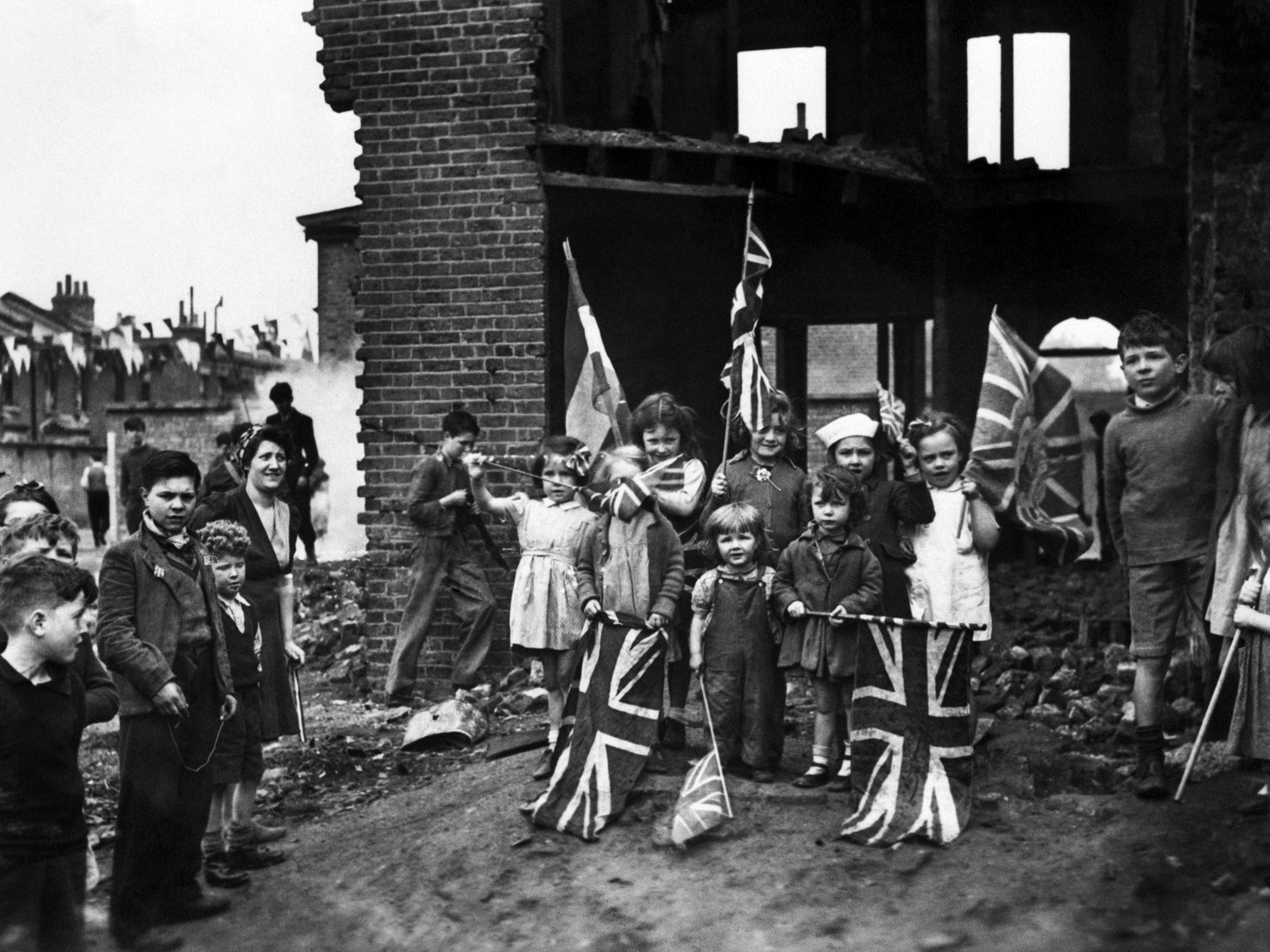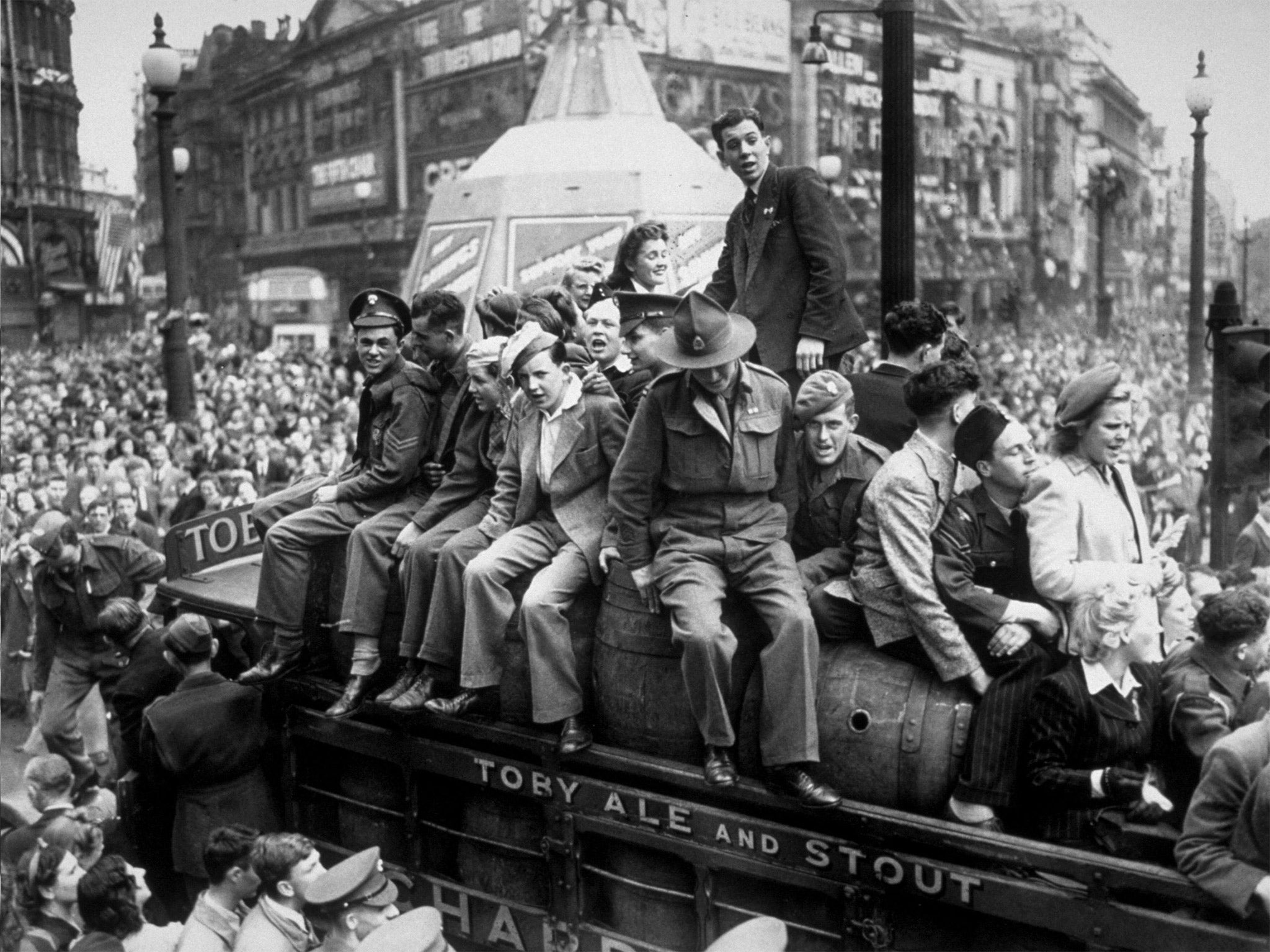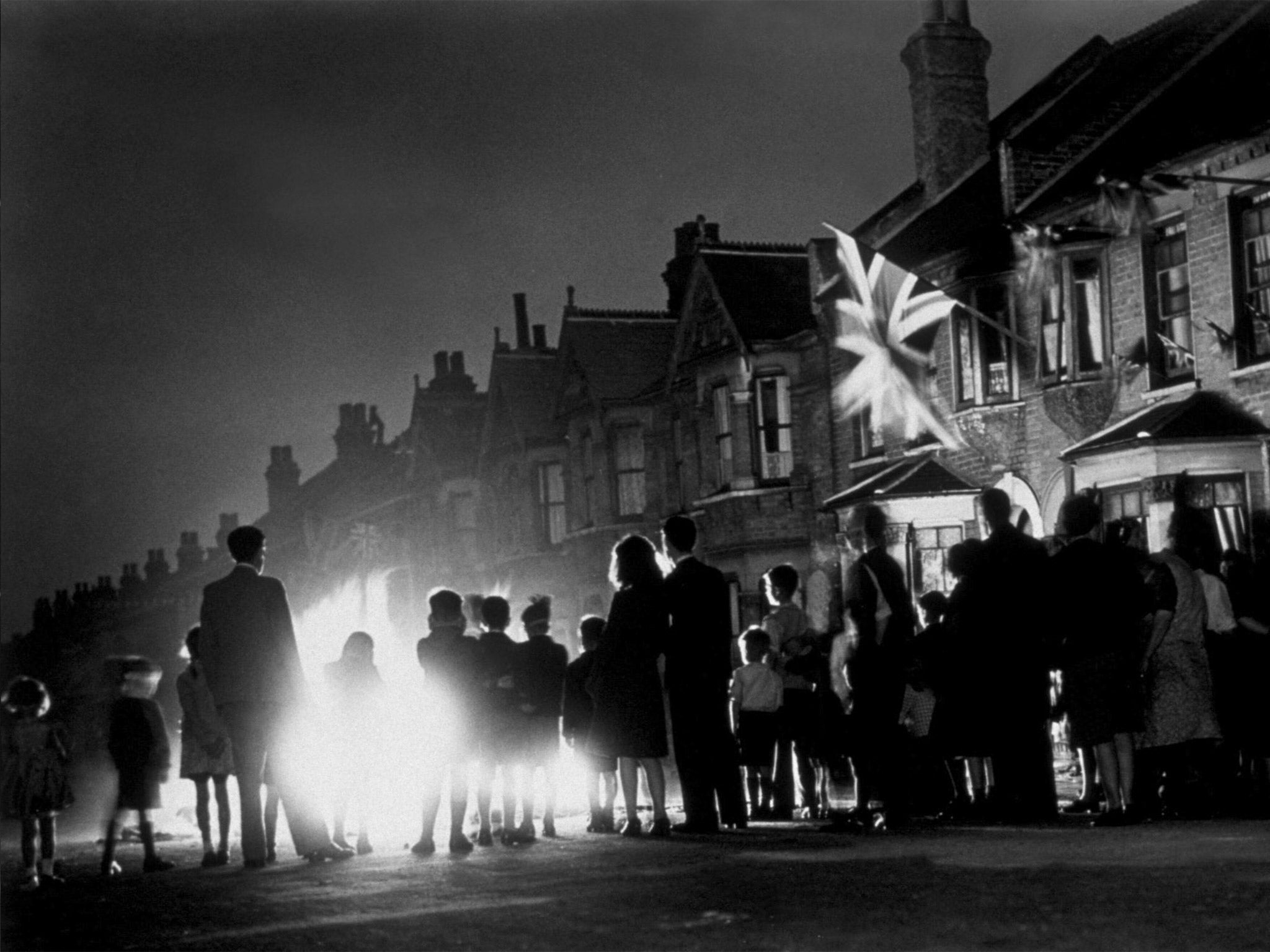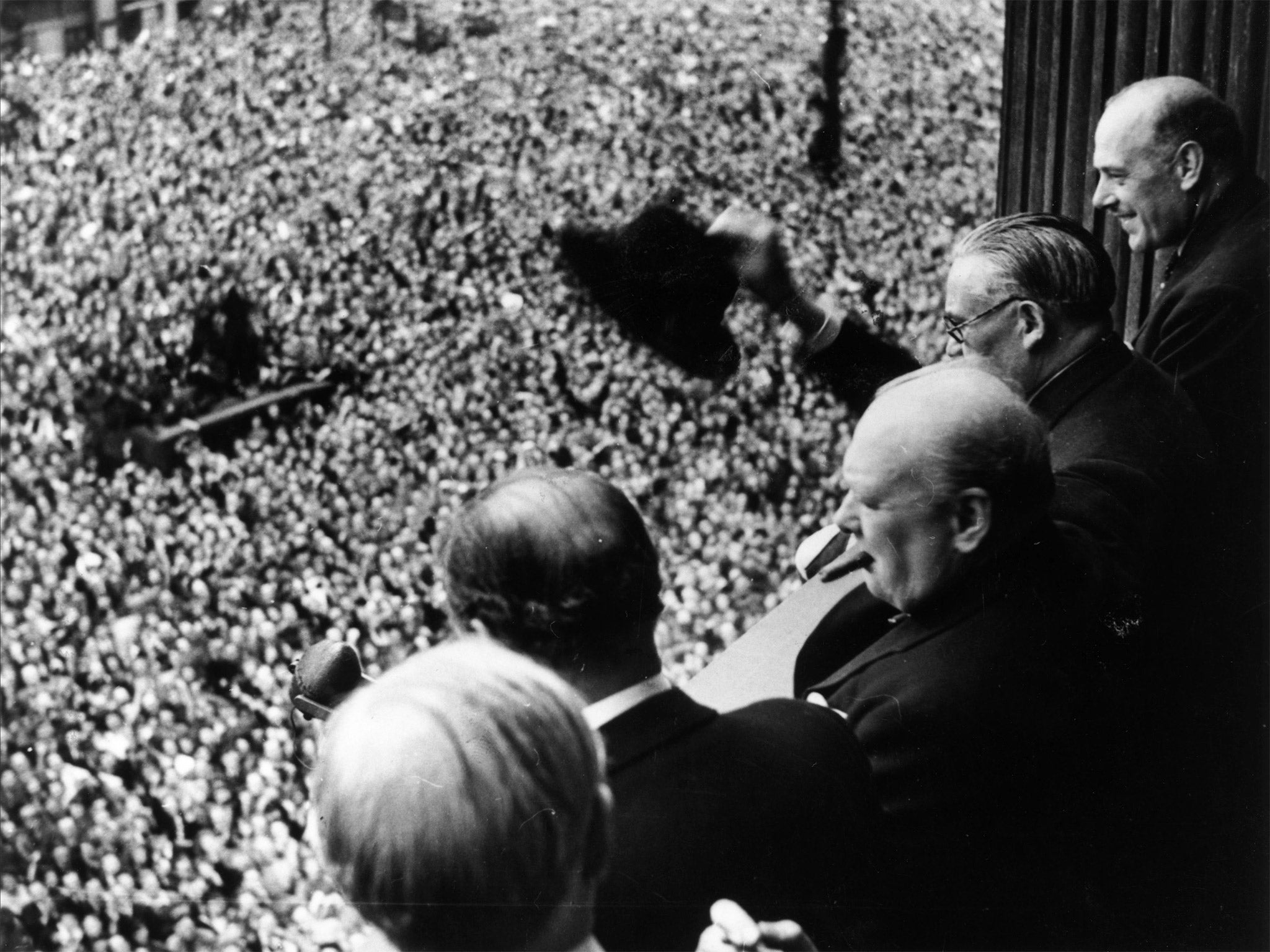VE Day 70th anniversary: How ordinary Britons celebrated the end of war in Europe
Our perception of VE Day usually involves crowds of giddy Britons casting off the shackles of war with gay abandon. The truth, says David Kynaston, was more nuanced. Not everyone was invited, or even excited, and foreboding hung in the air

Eleven o'clock in the morning on Tuesday, 8 May 1945, overheard by a Mass Observation investigator at a newsagent's in central London:
First man: "It's not the same. It should of been yesterday. When you think of it – peace signed at 2.40 in the morning, and then people wait and wait all day, and then nothing but it would VE Day tomorrow. No bells, no 'All Clear'; nothing to start people off."
First woman: "That's just what they were afraid of, I reckon."
More than a week after Hitler's death, and following the tardy radio announcement at 7.40 the previous evening, two days of celebration and good cheer were at last under way. But it took a while for things to warm up. Outside food shops the inevitable queues were even worse than usual and in the north of England it rained steadily until lunchtime.
Anthony Heap, a middle-aged local government officer from St Pancras, found himself (with his wife Marjorie) in Piccadilly. "Had some lunch at the Kardomah Café followed by ice cream at a Milk Bar in Leicester Square."
In Liverpool, Beryl Bainbridge's parents took her to a celebratory businessmen's luncheon: "The man who earned his living by having boulders broken on his chest in Williamson Square was standing outside the restaurant belting out the song, 'It's a lovely day tomorrow/ Tomorrow is a lovely day'. My Dad gave him a shilling and shook his hand... like they were equals. My mother made him go instantly to the Gents, to wash off the germs."
By early afternoon, huge crowds were gathering in all the main city centres, especially London. Gladys Langford, a middle-aged schoolteacher, caught a bus from Islington to Knightsbridge: "Piccadilly was already a seething mass of people. The hoarding around Eros was overcrowded with young people of both sexes, mostly of the Forces. About a third of the people were wearing paper-hats, many of them of very attractive design. People were everywhere – on shop-fronts, up lamp-standards, singing and shouting."
At 2.20 a bus managed to get through Whitehall – "HITLER MISSED THIS BUS" chalked across it – and soon afterwards, down at the jam-packed Parliament Square end, a 50-year-old man was overheard: "It was just like this after the last war and 12 months later we was standing in dole queues." But after cries of "Shut up", a middle-aged woman had, for the moment, the final word: "Nobody's going to make me miserable today. I've been waiting for it too long."
At 3pm the flags stopped waving, the bells stopped ringing, and the tumult briefly died down as everyone paused to hear Winston Churchill's short speech, delivered from 10 Downing Street and heard across the land not only on radios but from innumerable loudspeakers, including in Whitehall itself. He announced that the war in Europe would formally end just after midnight but that hostilities had in effect ceased; declared with a characteristic flourish that "the evil-doers now lie prostrate before us" (a gasp from the Whitehall crowds); and near the end almost barked out the words "Advance Britannia!"
"There followed," Harold Nicolson recorded, "'The Last Post' and 'God Save the King' which we all sang very loud indeed. And then cheer upon cheer." Though not from Vera Brittain, a pacifist throughout the war and now returning to the spot where she had been on Armistice Day, 1918. She generally found the mood of the afternoon "all so formal and 'arranged'", in comparison with the "spontaneity" 27 years earlier – but it was Churchill specifically whom she could not bear. She felt his appeal to crude nationalism all too "typical" and condemned him for having "introduced no phrase of constructive hope for a better society which renounces war".
As soon as his speech was over, the Heaps managed to beat a temporary retreat home (a top-floor flat near Judd Street) for "a much needed wash and cool off" on what was becoming "a sweltering hot day". And between 3.20 and 4.00, about a third of the adult population was tuned in to Bells and Victory Celebrations on the radio. Happily for BBC Audience Research, the "great majority" of its listeners "found this broadcast exactly fitted their mood and taste – it was vivid, noisy and inspiring; it brought invalids, and those who lived in remote corners of the country, in touch with the spirit of festivity in the capital and other cities visited".

Such as Manchester, where Frank Lewis, after studying at the university, had just started a job in a warehouse. At 3.15, having listened to Churchill's address, he left his suburban lodgings and caught a tram to the city centre: "Town was full of people, all lounging about doing nothing... I went in Lyons, by the Oxford cinema (where there was a queue) and got a cup of tea." Lewis, definitely a glass-half-empty diarist, then went to Albert Square: "Everybody seemed to be waiting for something to happen. I stayed for only 10 minutes, then came home… These so-called celebrations seem so useless – people hanging about 'doing nought'."
It's clear from the findings of the pioneering sociological-cum-anthropological organisation Mass Observation – which had begun in 1937 and relied largely on volunteer diarists and observers – that riotous abandon was the exception, concentrated in a few London focal points, rather than the rule.
"The excitement seems to be almost entirely a result of the stimulus of crowds and group feeling... People had put great efforts into decorating their houses, but seemed to anticipate little further in the way of celebrations... Bonfires, street tea-parties and fireworks, activities meant in the first place for children, were the chief features of provincial celebrations."
Adeline Vaughan Williams (the composer's first wife) was struck by how "very sedate" Dorking in Surrey was. Cecil Beaton found Kensington "as quiet as a Sunday" and added, "There is no general feeling of rejoicing... rather a dull numbness of relief that the blood-letting is over." Even young people could find it hard to celebrate with a full heart – "I felt most depressed which I felt was very naughty considering how long we have worked and fought for this," wrote Joan Waley, who worked near Bletchley on the Enigma code-breaking machines – while for those who had lost loved ones, a heavy tinge of sadness was inevitable. Nevertheless, most people were probably neither depressed nor ecstatic. Rather, they took the two days in their stride, reflected upon them to a greater or lesser extent, and above all tried to have a good time while enjoying the spectacle.
Many, as day turned to evening, went to thanksgiving services. "In the quiet of that tiny country church we found the note we really had been seeking," the Cotton Board's Sir Raymond Streat, one of whose sons had died in action the previous autumn, wrote to another son about attending Nether Alderley Church.
Later, more than a third of the adult population listened to the Home Service's Tribute to the King – running from 8.30 to 9 that night– in which representatives from different walks of life were lined up to pay live tributes.

This was the prelude to George VI's address to his people, aired live, and the King's stammer made it a somewhat nerve-wracking occasion for all concerned. In fact his longest-ever broadcast – some 13 minutes – did not go too badly (though, just before it began, a Mass Observation investigator slipped into her local pub in Chelsea to join three young Marxist neighbours who showed a sullen disrespect throughout). Thirty-nine per cent of adults then stayed tuned to Victory Parade –though by the time the programme ended at 10.45, the audience had dropped by more than half as even the unadventurous left home to see the floodlights and bonfires.
Of course, the image we have of that warm Tuesday night predominantly takes its cue from the events in London's West End. "There was wild excitement in Trafalgar Square, half London seemed to be floodlit – so much unexpected light was quite unreal," wrote Joan Wyndham, having taken time off from her WAAF mess in the East Midlands. "There were people dancing like crazy, jumping in the fountains and climbing lamp-posts." The iconography is understandably imperishable. But the West End was not London, let alone Britain.
"Usually, crowds were too few and too thin to inspire much feeling," reckoned Mass Observation, "and on VE Night most people were either at home, at small private parties, at indoor dances or in public houses, or collected in small groups around the bonfires, where there was sometimes singing and dancing, but by no means riotously." Most contemporary accounts confirm this rather low-key feel. "The town was thronged but the crowds were orderly," wrote Colin Ferguson, a pattern-maker from Glasgow. "Most of those walking about evidently just out to see what was going on."
So, too, in the Birmingham suburb of Erdington, where, after the King's broadcast, the bonfire in Mr Swinnerton's field in Marsh Lane was the attraction for Mary King, her husband and friends: "It was a tremendous scene. Everything quiet and orderly and enjoyable."
However, not all the bonfires were quiet, meditative affairs. Certainly not in deepest Herefordshire, where the local paper described "A Country Village Celebration":
"Passing through the village of Stoke Lacy early on Tuesday afternoon one was startled to see the effigy of Hitler hanging from a gibbet in the car park of the Plough. That evening, a crowd began to gather, and word went round that Hitler was to be consumed in flames at 11. In a few minutes the body of Hitler disintegrated as his 1,000-years Empire has done. First, his arm, poised in a Heil Hitler salute, dropped as smartly as it was ever raised in life. Quickly followed his German hat; then a leg fell off, and then the flames burnt fiercely to the strains of 'Rule Britannia', 'Land of Hope and Glory', 'There'll Always be an England' and 'Roll out the Barrel'."
There were similar scenes elsewhere. In the West Midlands, where streets in the working-class districts of Wolverhampton "vied with each other in the number of streamers and flags they could produce", Hitler was "burned many times over"; in a Coventry suburb a self-appointed "Mayor and Wife" – with a builder, "the fattest man in the street, and the jolliest", as the Mayoress – conducted a mock funeral for the effigy.
According to the survey, "The whole performance seems to have been charged with a deep satisfaction for most of the people who watched it." But none such communicated itself to Henry St John, living in the Westbourne Hotel in Bristol. For him, rather as for Philip Larkin, the war had essentially been a personal inconvenience, and his diary entry for VE Day was entirely in character. It read in toto: "It was learned that the cook, who had been living at the Westbourne, went out yesterday and had not come back."
Nor did St John's next entry, recording the events of the Tuesday night, quite take the big view: "A party in a nearby house went on until 2am, with music, dancing, singing, and shouting, so that I could not sleep until well past that hour and, as I slept badly the previous night, I felt good for nothing today."

St John seems to have been a man of virtually non-existent human sympathies but was not wholly exceptional in apparently having zero interest in this historic event. The writer Denton Welch, living in Hadlow in Kent, then felt – as surely so many did – the discomfort of imminent change from a condition that, for all its inconveniences, had become familiar: "There were awful thoughts and anxieties in the air – the breaking of something – the splitting apart of an atmosphere that had surrounded us for six years."
VE+1, the Wednesday, was inevitably a bit of a let-down, not helped by most pubs (in London anyway) having run out of beer. "This VE business is getting me down with fatigue" was how the diarist James Lees-Milne bluntly put it. A certain amount of normality returned, but there were still plenty of festivities, including a plethora of street parties for children. These were mainly jolly affairs, though not without their tensions. "Half our road where all my friends lived had semi-detached houses and detached bungalows while at the bottom end the houses were small and terraced," one Michael Burns later recalled about growing up in Tolworth, just off the Kingston Bypass. "We had a street party that our parents were insistent should not include the children from the terraced houses, so there were two parties in Southwood Drive divided by about two hundred yards."
As for Anthony Heap, it was "once more unto the West End", where he found "the same good humoured crowds, the same high spirited skylarking, the same awe inspiring floodlighting", though it "wasn't perhaps quite so overwhelming an occasion". He finished with "a last enchanting eye-full of the floodlit splendour of St Paul's Cathedral, Houses of Parliament etc before catching "what must have been the last 68 bus to Euston Rd which was completely illuminated from end to end with its full pale-blue peace-time lighting".
After seemingly interminable blackouts and no street lighting, this did indeed "seem the most amazing thing – this prodigality with light", as Alan Bennett would express it when describing his VE memories (improbably enough of Guildford, to where his parents had moved briefly from Leeds). Heap concluded his diary entry without ambiguity: "And so we came to end of two perfect days. They couldn't have furnished a happier set of memories to look back on in my old age."
At the same time, the Chelsea-based Mass Observation investigator was walking home, and her report finished with this vignette: "On a piece of waste ground in Flood Street, 10 or 12 children are silently gathered round a bonfire. They look tired but happy and absorbed. One says in a low voice, 'It'll last a long time yet.' A man at the end of the street is striking matches and says he is looking for a shilling he has dropped. Throws match away angrily, saying, 'They don't last long enough'."
This is an edited extracted from 'Austerity Britain, 1945-1951: Tales of a New Jerusalem' (£12.99, Bloomsbury)
Join our commenting forum
Join thought-provoking conversations, follow other Independent readers and see their replies
Comments